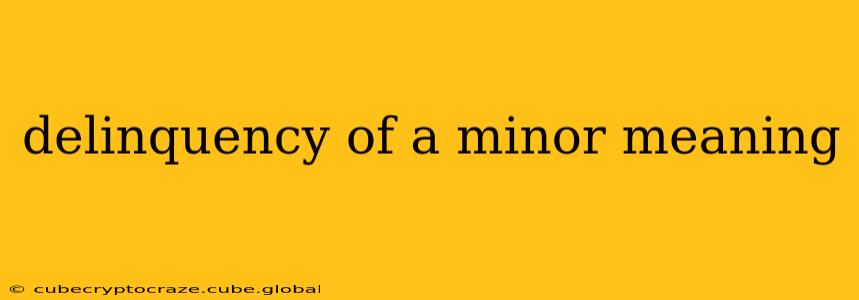The term "delinquency of a minor" refers to acts committed by a child or adolescent that would be considered crimes if committed by an adult. It's a crucial legal concept that distinguishes between a child's misbehavior and actions requiring intervention by the juvenile justice system. This isn't about simple childhood mischief; it involves behaviors that violate laws and require a formal response from the legal system designed specifically for minors.
What Actions Constitute Delinquency?
Delinquency encompasses a wide range of actions, varying by jurisdiction and the age of the minor. Common examples include:
- Violent crimes: Assault, battery, robbery, homicide.
- Property crimes: Theft, vandalism, burglary, arson.
- Drug offenses: Possession, use, distribution of illegal substances.
- Status offenses: These are actions only illegal because of the minor's age, like truancy (skipping school), running away from home, or underage drinking. While not crimes for adults, these actions are considered delinquent behavior in minors.
The specific offenses considered delinquent acts are defined by state and sometimes even local laws. This means there can be significant variations in what constitutes delinquency across different regions.
What is the Difference Between Delinquency and Criminal Behavior?
The key difference lies in the legal system handling the case. While both involve illegal acts, delinquent behavior is handled within the juvenile justice system, aiming for rehabilitation and reform rather than punishment. Criminal behavior, on the other hand, falls under the adult criminal justice system, with a focus on punishment and incarceration.
The age at which a minor can be tried as an adult varies significantly by state and the severity of the crime. Some states have laws allowing minors to be tried as adults for particularly heinous crimes, even if they are below the age of majority.
How does the juvenile justice system differ from the adult criminal justice system?
The juvenile justice system emphasizes rehabilitation, focusing on the needs of the child and their reintegration into society. This often includes:
- Probation: Supervision within the community.
- Counseling: Addressing underlying issues contributing to the delinquent behavior.
- Community service: Providing opportunities for restitution and positive contributions.
- Educational programs: Improving academic skills and life skills.
- Placement in a juvenile detention facility: A last resort, used for serious offenses or when other measures have failed.
In contrast, the adult criminal justice system primarily focuses on punishment, using measures like fines, jail time, and community corrections. While rehabilitation programs may be available, they are not the central focus.
What Happens After a Minor is Deemed Delinquent?
Once a minor is found to be delinquent, a judge will typically issue a disposition, which is the equivalent of a sentence in the adult criminal justice system. This could involve a combination of the interventions mentioned above.
The process varies by state, but generally involves an investigation, a hearing (similar to a trial), and then the determination of delinquency.
How is Delinquency Determined?
The determination of delinquency usually involves a series of steps:
- Arrest: A minor is taken into custody.
- Detention: The minor may be held in a juvenile detention center.
- Petition filed: Formal charges are brought against the minor.
- Hearing: A judge determines whether the minor is delinquent.
- Disposition: The judge decides the appropriate intervention.
The specifics of this process vary by jurisdiction but generally follow a similar structure.
What are the Long-Term Effects of Being Deemed a Delinquent?
A delinquency finding can have significant long-term consequences, including:
- Criminal record: Although often sealed, this can affect future employment and educational opportunities.
- Stigma: The label of "delinquent" can create lasting social barriers.
- Limited opportunities: Access to certain jobs, housing, or educational programs might be restricted.
It's crucial to understand that the goal of the juvenile justice system is rehabilitation, but the lasting impacts of a delinquency finding can be substantial.
This information is for educational purposes only and does not constitute legal advice. For specific legal advice regarding delinquency of a minor, it is essential to consult with a qualified legal professional in your jurisdiction.
